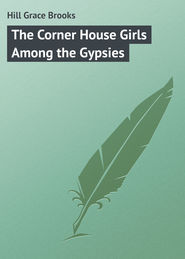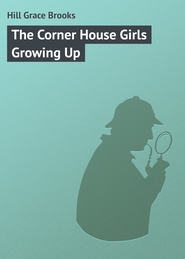По всем вопросам обращайтесь на: info@litportal.ru
(©) 2003-2024.
✖
The Corner House Girls' Odd Find
Настройки чтения
Размер шрифта
Высота строк
Поля
She said all this too low for her father to hear. She added: “Pop always had his health and strength before.”
“Oh, dear me!” groaned Agnes, impulsively. “I wish Neale were here.”
“Oh!” ejaculated the circus girl, sharply. “What Neale’s that?”
Agnes remained silent, sorry that she had spoken so thoughtlessly.
“I might have known you were one of those girls,” added Barnabetta.
“What girls?” asked Agnes, curiously.
“Those that Neale O’Neil lives with at Milton.”
“He doesn’t live with us. He lives next door to us – with Mr. Con Murphy.”
“Bill Sorber said he lived with some Corner House girls. That’s what he called you,” said Barnabetta.
“Just the same,” said Agnes, boldly; “I wish he were here. He’d know what to do – how to help you.”
But Barnabetta was despondent. “Nobody can’t help us,” she said. “We’re in bad.”
“Oh! I will find some way of helping,” declared Agnes, trying to speak comfortingly.
“Huh! lots of good you can do now,” grumbled the other. “You and that nasty dog has just fixed Pop.”
“It wasn’t Tom Jonah’s fault. And I’m sure it wasn’t my fault. He was only defending me. You and your father shouldn’t have tried to stop me.”
“You hid the dog in the bushes a-purpose,” cried Barnabetta, angrily. “You know you did.”
“No, I didn’t. And he scared me enough, too. I thought he was a wolf,” said Agnes, anxious to explain though why she should be put on the defensive, it would be difficult to tell.
“Well,” concluded Barnabetta, roughly, “you can’t be any good here.”
“I know I can’t. But I believe I can help you just the same.”
“Don’t want your help,” growled the circus girl.
“Oh! don’t say that,” begged the Corner House girl. “I can go to Mr. Bob Buckham and get his carriage and horses – ”
“We haven’t got any money to pay for a carriage,” said Barnabetta, quickly.
“You won’t have to pay Mr. Buckham for doing an act of Christian charity,” declared Agnes, and she set off immediately, Tom Jonah following closely at her heels.
Barnabetta did not even bid her good-bye. She was all solicitude for her father’s hurt ankle, and was now kneeling by him, packing the snow about the swelling foot. But she was “as hard as nails” toward the Corner House girl.
Agnes hurried right down to the railroad and walked without molestation to the crossing she had spoken of. There, up the snowy lane, she obtained her first glimpse of Mr. Bob Buckham’s house.
She had come a roundabout way to it, indeed. It was now long past noon and she had missed her dinner. Of course, Mr. and Mrs. Buckham had ceased expecting her long ago.
The big girl who worked in Mrs. Buckham’s kitchen – Posey by name and an autocrat to a degree – met Agnes with a cheerful greeting, but refused admission to Tom Jonah.
“No. He can’t come in. I just been scrubbin’ my floor and I can’t ‘low no dog trackin’ it up. You drop your arctics there on the porch, Miss Aggie, and then you can run in to Mrs. Buckham.”
“If Tom Jonah only wore arctics!” sighed the Corner House girl.
“Well, he don’t – more’s the pity,” agreed Posey.
Agnes ran into the invalid’s room, all breathless, but full of her adventure. There sat Mrs. Buckham in her wheel-chair, surrounded by bright worsteds and fancywork, as busy and smiling as though she had not spent twenty years between that chair and her bed.
“Here’s our Corner House girl at last. And why not to dinner?” cried Mrs. Buckham.
“Oh, mercy me! I didn’t even re-mem-ber dinner till just this minute!” Agnes confessed.
“Your poor child! No dinner? Quick, Posey! here’s a starving child – ”
“Dear Mrs. Buckham – wait! Never mind me. I sha’n’t starve yet,” declared the plump Agnes, laughing. “Look at me. Do I seem so frail? And I’ve had the greatest adventure!”
“Well, well!”
“Where is Mr. Buckham? I must tell him all about it, too,” Agnes said, excitedly.
And here came the farmer as she spoke – bewhiskered, grizzled, keen-eyed and always smiling, who cried:
“Here’s the tardy one! Why, I thought you were coming out betimes, young lady? How are all at the Corner House?”
Agnes was too greatly excited to reply in full to that question. Mr. Bob Buckham sat down and the Corner House girl related all that had befallen her since she had left home that morning – save that she said nothing about the mystery of the big album she had found in the Corner House garret, and the Scruggs’ interest in its contents.
Her explanation, therefore, as to why the circus clown and his daughter desired to detain her at their camp in the woods was rather hazy; but the fact of the clown being hurt and the helplessness of the two trampers were sufficient to excite the pity and alarm of the farmer and his wife.
“Tut! tut!” clucked Mr. Buckham. “They can’t stay out there in the snow. It’s going to be mighty cold to-night.”
“It is awful to think of,” agreed Mrs. Buckham. “But Posey’s got her hands full. If I was up and about myself – ”
“Oh, dear, Mrs. Buckham! I wasn’t thinking of such a thing as bringing them here,” Agnes cried. “The man can’t walk to the Milton car. He can scarcely walk at all, with that sprained ankle. But if Mr. Buckham will hitch up and drive over there, and take ’em to the car, I can get ’em from the car to the Corner House.”
“Oh, dear me, child! To your house?” cried Mrs. Buckham.
“Dunno ’bout that,” said Mr. Buckham.
“Of course,” said Agnes. “We’ve plenty of room – and beds enough for a hotel.”
“But what will Ruth say?” asked the farmer’s wife.
“And what will your Mrs. MacCall say, eh?” chuckled the farmer.
“Why, don’t you suppose they will be kind to ’em, too?” cried Agnes. “Ruth would do the same herself. I know these poor folk have very little money and nowhere to go – ”
“Enough said, Robert. We have no right to thwart such unselfish impulses,” Mrs. Buckham said. “Go and harness up the carriage – ”










